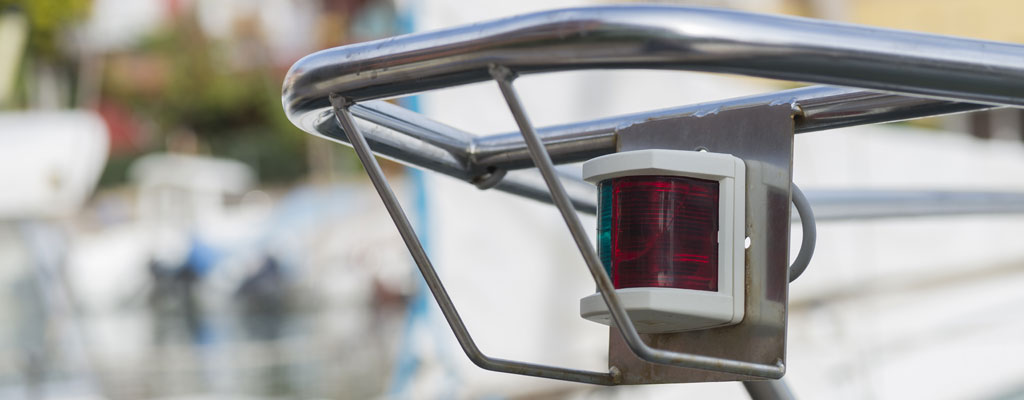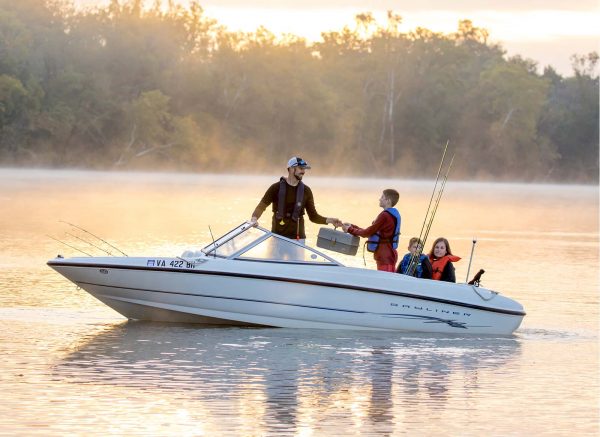
Josfor/Shutterstock.com
DWR Conservation Police Officers on the water often see some strange lights at night, and they are not from UFOs. Despite the trend to light up your boat, your lighting configuration may not only be creating a navigation hazard for your fellow night-time boaters, but they may also be illegal.
Most everyone knows the proper lighting configuration for motorboats. When a motorboat is operated at night, sidelights are required on the bow (front) and an all-around white light at the stern (back) of all motorboats. The required colors of the sidelights are red and green – red lights belong on the port side of the vessel and green lights belong on the starboard side of the vessel. The port side is the left side of the boat when facing the bow (front) of the boat when standing inside the boat. These lights are required to shine from dead ahead to 112.5° on their respective sides. Most recreational motorboats can utilize an all-around white light on the stern (back) of the motorboat (if your boat is greater than 39’ check this site). A full circle of white light is created by an all-around light – the light must be visible 360°. This light needs to be 1 meter (3.3 feet) above the sidelights and not blocked by any portion of the vessel. When a boat is anchored at night, the side navigation lights are extinguished, but the all-around white light must be on. The proper placement of a boat’s navigation lights allows other boaters to determine what type of boat you are (manual vs power vs sail) and which direction you are heading so that right-of-way can be determined.
These rules on lighting configuration have not changed in years, but more and more, our officers are seeing lighting violations and motorboats operating at night that are a hazard to others. Officer Michael Morris of Smith Mountain Lake reports several “strange” things he has seen while boating at night. All-around light (stern light) issues include: placing black tape over part of the part of the stern light that shines down inside the boat; placing a hat, sock, bag, etc. over the stern light when trolling; positioning the stern light too low so that it cannot be seen because it is blocked by the operator or motor while underway; pontoon boats with vinyl tops that fold up and block the visibility of the stern light or the stern lights will be folded down which causes them to not be visible when approaching head on.
Another issue often seen at night is boats operating with their docking lights on. Stacey Brown recalls a time when a boater mistakenly called these lights the “head lights” for the boat. Boats do not have head lights; the docking lights should only be used close to where the boat is being moored to ensure safe docking at night. Boats using docking lights while away from the dock are a hazard to other boaters. It interferes with the night-time vision required to safely operate at night. Docking lights may also cause the red and green navigation lights to become washed out so other boaters are unable to determine navigational right of way.

An image of a boat
There are often violations with the red and green navigation sidelights as well. Some bass boats have trolling motors that block the red and green navigation lights. We are seeing after-market strip style LED lights being installed on boats. All lights still need to meet the Coast Guard requirement for visibility and the 112.5 arc of visibility as mentioned above. Unless your boat was manufactured with these lights (manufacturers follow the USCG boat building guidelines) – we do not recommend replacing your existing lights with any after-market lighting configuration. We have been receiving complaints that those lights are too bright and interfere with the ability of other boaters to safely navigate the waterways by impeding their night vision and making it difficult to see your navigation lights.
Recently, the most frequent request for information regards the placement of other LED strip lights that might be placed along the sides or stern of a motorboat. As is true with other lighting issues, the installation of these lights may impact the ability of other boaters to safely navigate the waterways by impeding their night vision and making it difficult to see your navigation lights. In addition, boaters are prohibited from using lights that might be confused for navigation lights (white, green, red), or light colors reserved for law enforcement (blue), or any other color used in the navigation rules (yellow is reserved for towing/tugs).
Night navigation brings many challenges to boaters on Virginia’s waters and the importance of knowing the navigation rules. New LED options may make your boat look “cool”, but may be a hazard to other boaters when you are underway. Be responsible, be safe, have fun!
Learn More:
This article was written by Conservation Police Officer Michael Morris and Stacey Brown, DWR Boating Safety Program Manager.


